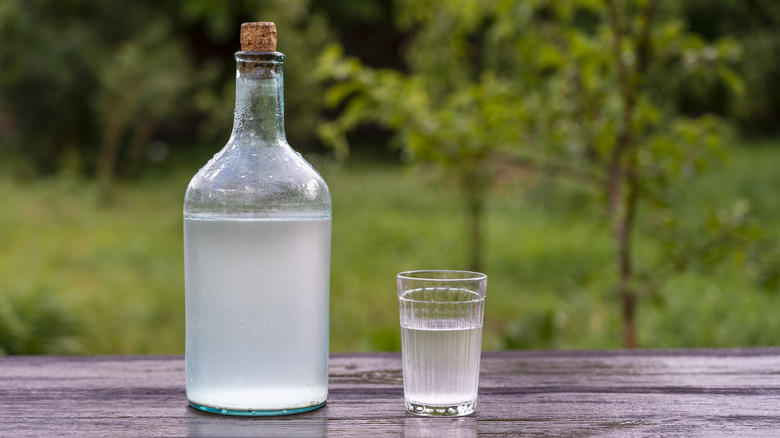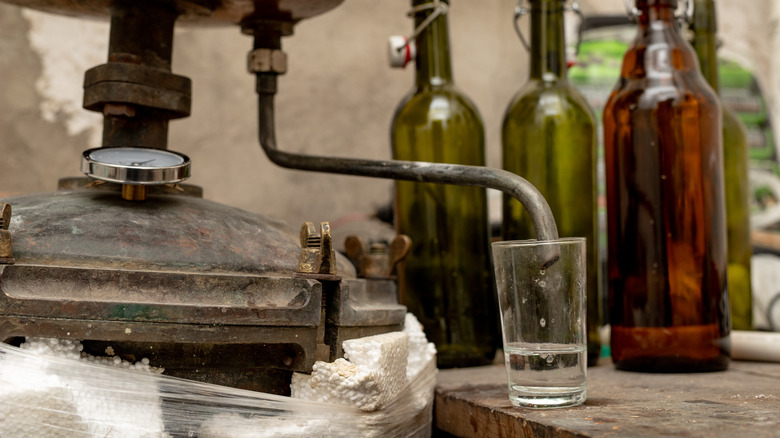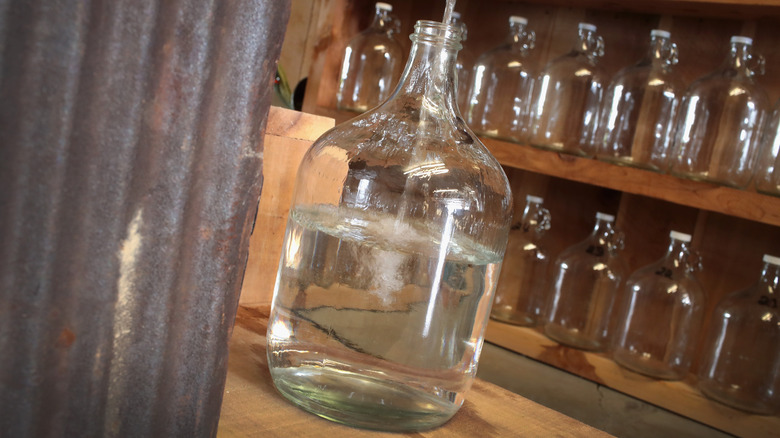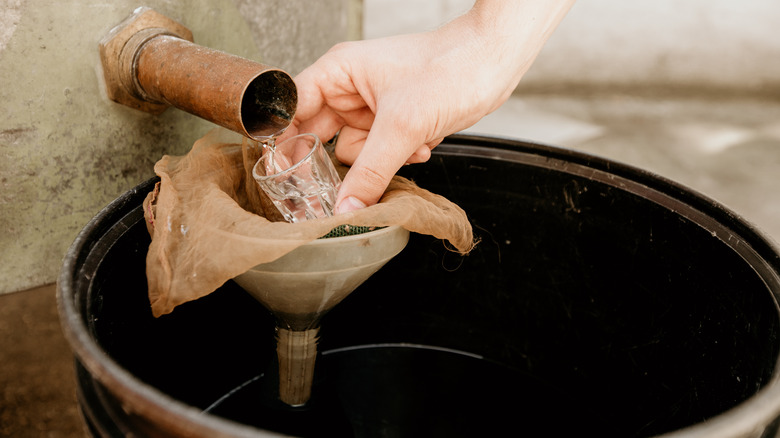Is Moonshine Still Illegal In The US? The Answer Is Complicated
Moonshine is a name that's familiar to most Americans. More than just a harsh drink, this clear, pungent liquor has been the literal "rebel spirit" of America since its conception and, by extension, a full-fledged historical symbol. From the Whiskey Rebellion of 1791, when moonshiners and other whiskey-makers rebelled against the federal government to protest heavy taxation, to the days of Prohibition during which it's speakeasies' drink of choice and the livelihood of smugglers and gangsters. In popular culture, you'd find no shortage of mentions of the drink in video games, television, or comic books to keep the name alive, too.
And yet, despite its reputation as an outlaw, if you browse the liquor aisles, you'll find no shortage of liquor bottles proudly bearing the word "Moonshine" on their labels. Surprisingly, law enforcement doesn't seem too bothered by their presence. So, has the government finally changed its mind about moonshine and made it legal at last? Well, the answer's a bit complicated.
What exactly is moonshine?
First, we'll have to establish what exactly is moonshine. It goes by many different nicknames, depending on where you live. You may have heard it as white lightning, skullcracker, and bathtub whiskey/gin. Some may even slyly refer to it as "mountain dew" alongside a wink (yes, the green soda originally took its name from the liquor). No matter what you call it, they all refer to the same thing: a clear, unaged whiskey primarily distilled from corn using homemade copper or steel stills. The final product packs a powerful punch, having an alcohol content ranging from 40% to as high as 80% alcohol by volume.
Moonshine shares many similarities with "white dog," the legal, clear whiskey fresh out of the still. The key difference lies in their legal status: White dog is legitimate, while moonshine is not. As Clay Risen said in an article for The Atlantic, if the owner of the still hasn't ever been arrested by the Bureau of Alcohol, Tobacco, Firearms and Explosives, chances are, they weren't really making moonshine!
To make moonshine is to flaunt the law
Moonshine has long had a contentious relationship with the law in America, but it hasn't always been the case. There was a time when whiskey-making was not only legal but also incredibly commonplace. Everyone had a still on their front porch, and making moonshine was as ordinary as growing crops back in the 17th century. Things only started to change when the government began taxing whiskey, most notably with the Whiskey Tax of 1791. Aside from the tax being a heavy burden on small-scale moonshiners, they also believed that it was their "God-given right" to make their liquor, so the Whiskey Rebellion broke out. While the government prevailed and the taxes were held, moonshine-making really went underground during this period. The move away from law-abiding distillation gave rise to the name "moonshine", as moonshiners had to make their liquors at night under the moonlight to avoid detection.
Until Prohibition, moonshine was a small-scale operation in the Appalachians, as city-dwellers preferred wine, rum, rye whiskey, and other spirits. When those supplies ran dry due to government crackdowns, people turned to moonshine as their (only) tipple. Moonshine production quadrupled, with speakeasies and bootleggers distributing "white lightning" from coast to coast, making moonshiners the quiet heroes of a thirsty nation.
Where does that leave moonshine today?
Distilling hard liquor like moonshine in the U.S. without a license remains a felony, however, enforcement has become far more relaxed than in the past. In the '50s through the '70s, government agents could throw the book at you for simply possessing the cap of an unlicensed still. Today, some states like Alaska, Massachusetts, and Missouri even allow you to make moonshine if you pinky-promise that it's either for personal consumption or only consumed within the confines of your property.
The reason enforcement of moonshine-making is so strict in the first place is that unlike the romantic vision of heroic moonshiners and bootleggers of the Prohibition days would have you believe, moonshine-making is a dirty business. Lots of moonshiners are selling over-proofed alcohol that could cause methanol poisoning by using low-quality ingredients. In comparison, homemade low-proof drinks like beers and wines are legal without a license in all states, so long as you don't intend to sell them.
As for those fancy "moonshine" bottles sold freely at your local liquor store? They're legally produced white whiskey just using the name as a marketing term. They could get the scowl-inducing strength right, and maybe even the taste. But to say they're real moonshine? No chance. If you can call it legal, then it's definitely not moonshine.



